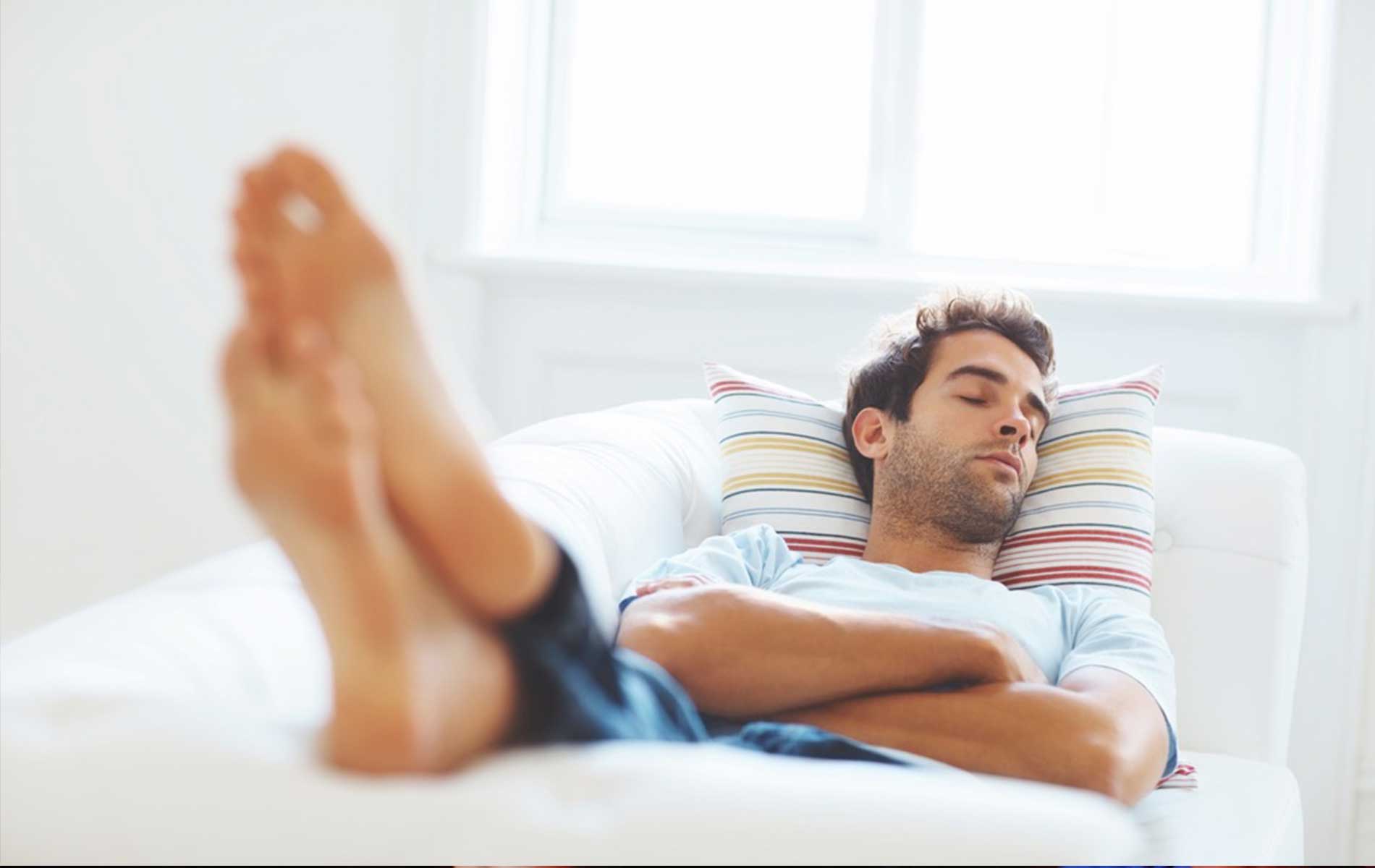
vie-magazine-hero-health-nut
To Sleep … Perchance to Dream
By Clark Peters
Sleep may be one of the most necessary and least understood of nature’s functions. Indeed, as one renowned sleep researcher, Allan Rechtschaffen, put it, “If sleep doesn’t serve an absolutely vital function, it is the greatest mistake evolution ever made.” He is referring, of course, to the lost hours (approximately one-third of human lives), and the fact that all species either sleep (mammals and birds) or find repose in another way (fish, reptiles, and insects). In recent history, we humans, at the top of the food chain, haven’t had to worry about predators, but every other species must—and they lie completely vulnerable to predation while asleep or at rest.
There is little doubt that the vital functions of sleep do exist, even if we haven’t been able to discover them scientifically. Empirically, you know that after a near-sleepless or restless night, you wander through the next day tired, unfocused, needing energy boosts (insomnia leads to weight gain), and generally in a bad mood (insomnia also leads to depression—and vice versa). Well, a bad night followed by a crummy day is one thing. Being unable to sleep at all is lethal!
Forty families globally carry a gene for a very rare disease, fatal familial insomnia (FFI). The disease progresses from trouble napping to trouble sleeping to the complete inability to fall asleep, which, as the name implies, leads to death in a relatively short time. The fact that zero sleep kills was confirmed by Rechtschaffen in his experiments on rats. He forced them to stay awake by suspending them over water on a cone-shaped disc, which would tumble the rats into the water if they slept, immediately waking them. After two weeks of this, all the rats were dead.
So, complete lack of sleep is lethal and, logically, it follows that insufficient sleep negatively impacts our health. The surprising thing about FFI is that autopsies/necropsies on the deceased showed no apparent cause of death. All organs, cells, and tissues were intact and apparently healthy. Scientists concluded that death was caused by exhaustion. While scientifically unsatisfying, this conclusion squares with the empirical evidence of feeling wretched after a sleepless night.
Clearly, then, sleep serves a restorative purpose at least. The research suggests several other things may be going on as well. Using an electroencephalographic (EEG) machine to measure the brain wave patterns of sleeping subjects suggests that sleep has many phases ranging from near sleep—just after you close your eyes—to ever-deepening stages that are periodically interrupted by rapid eye movement (REM) episodes, indicating dreaming. Tracking a full night’s sleep is fairly complex, but it is clear that a good night must include the deep stages and several REM episodes. It is thought that the deepest stage is truly restorative, allowing cell repair and immune system enhancement. REM seems to be a reliving of past events, although the dream itself rarely mirrors actuality. The theory is that the brain is sifting through information and committing important items to long-term memory and erasing those it deems unimportant. This provides both memory and personality functions since your persona is a combination of what you think and remember. So, sleep helps us remember what’s important by letting go of what is not. It’s sort of like “cleaning up” your computer by “trashing” unused icons to enhance its performance. Again, as in most of what we “know” about sleep, this is the current theory.
THE INSOMNIA EPIDEMIC
Unfortunately, we don’t always get sleepy or stay asleep when we need to. Insomnia is at epidemic levels throughout the developed world. About 25 percent of people have serious insomnia issues and very few of the remainder are solid sleepers every night. Insufficient sleep builds what is called “sleep debt” and the larger an individual’s sleep debt becomes, the more serious the consequences: to name but one, it is estimated that fully 20 percent of serious motor accidents are due to driver sleepiness. Clearly, sleep debt would also have a negative effect on:
Job productivity/job retention;
Relationships/divorce rates;
Joie de vivre, which is our ability to enjoy all that life offers,
… and so on.
Well, for one industry, Big Pharma, the problem results in a windfall. Sleep prescriptions numbered fifty-six million in 2008, up 50 percent from 2004, and are worth billions of dollars. Those stats do not include over-the-counter sleep aids. The country is clearly sleep deprived and trying to solve the problem chemically.
Some ninety different types of insomnia have been characterized by sleep scientists. At either end of the spectrum are:
True insomnia—for unidentifiable reasons
Sleep apnea—actually a physiological problem
Apnea has a cure. It is characterized by heavy snoring interrupted by lack of breathing followed by a heavy snort as the brain, starved for oxygen, wakes the sufferer. Apnea is caused by soft tissues in the throat relaxing with sleep and constricting the windpipe. Since the wake-up snort restores oxygen, the body quickly relaxes into sleep again causing the same asphyxiating results and the wake-up cycle to be repeated. The apnea sufferer, then, basically gets hundreds of “micronaps” but can never get to deep sleep stages or attain REM episodes. If you believe you may be an apnea sufferer, spend a night in a sleep center—they will observe you all night and can certainly recognize deep sleep, REM, apnea, and other sleep disturbances. The night is painless and very informative. If apnea is diagnosed, the solution is a device worn every night (called a CPAP machine), which holds the airways open. Problem solved, although your sex appeal is considerably diminished in this contraption. Of course, apnea isn’t attractive to your bedmate either, since your problem becomes his or hers as well.
The cause of true insomnia (and the various other names given to this condition) is clearly a complex problem; it may be a psychophysiological combination. This will be small consolation to sufferers, but about the best one can do currently is called cognitive behavior therapy (CBT). CBT is a combination of knowledge and belief that the problem is manageable (and some require counseling for this) coupled with good sleep hygiene. The hygiene “rules” are as follows (as usual in discussing sleep, these help most, but not all, sufferers):
- Your sleep area should be dark, cool, and quiet
- Do not exercise late in the day
- Go to bed when you start to feel sleepy—the alternative is a “second wind”
- Reset your circadian clock; our ancestors went to bed at dusk and rose at sunrise. Electricity, the light bulb, TV, and computers have messed with these instincts. Therefore,
- Go to bed earlier (whatever earlier is for you)
- No TV/computers after 9:00 p.m.
- Dim the lights after 9:00 p.m.
- Try to establish a set sleep and wake time
- Naps are okay if brief, about ninety minutes max during afternoon energy “dip”
- Nasal strips are actually beneficial
- Snacks should be modest and no later than midevening; no stimulants after supper (caffeine, colas, chocolate, candy, etc.)
- Bedrooms are for sleep and sex only—no TVs, computers, work, etc.
Most of this is common sense. What follows are other suggestions, which again, some have found helpful. Most of these can be found in health food stores:
- Aromatherapy – Many folks find a dab of lavender or chamomile oil behind the ears soothing. Lemon balm and others that you find comforting can also serve.
- Supplementation – Melatonin is a hormone produced by the body to promote and enhance sleep. Supplements are available in pill form in 1, 3, 5, and 10 mg. Start with 1 or 2 mg and add until desired effect. Some use 20 mg/night. Experiment.
- Valerian root (extract) – This one has been around for generations. Available as a tea or in pill form, it normally takes a few days to kick in.
- GABA – Gamma-aminobutyric acid is one of the amino acids produced by your body. This one is good for those who lie there, mind whirring, solving problems. It seems to have a distinct calming effect.
- Others – Acupuncture, hypnosis, sleep CDs, etc., may also be worth exploring.
It is as frustrating to me to write an article like this as it is for those of you struggling with sleep problems to read. I would prefer to offer some solid answers that are guaranteed to help with the issue. Unfortunately, decades of research on the subject of sleep leave us with only helpful suggestions. Clearly, we have “miles to go before we sleep.”
— V —
Clark Peters has spent much of his time since his retirement in 1997 researching health and longevity. His purpose in writing these columns is to share his findings with readers in plain English and assist them in making accurate and informed lifestyle choices. The columns are based on the premise that we all want to live a long, vigorous life and are striving to make healthy choices.
While Mr. Peters believes these recommendations will result in better health and longevity for almost everyone, the reader is advised to consult with his or her physician before making any major lifestyle changes. You may e-mail Mr. Peters at: hlthnut@earthlink.net.
Share This Story!
KEEP UP WITH THE LATEST STORIES FROM VIE




































































































































